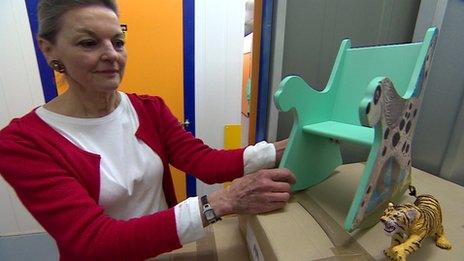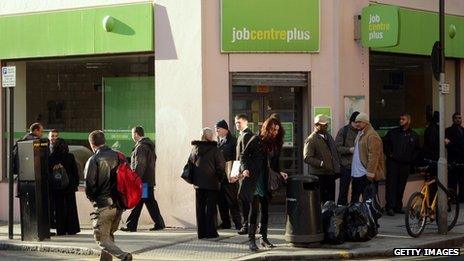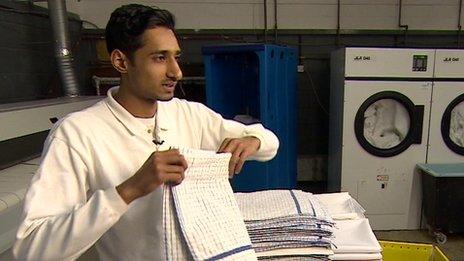Self-employment: First choice or last resort?
- Published

Zandra Johnson launched Fairytale Furniture as "a bit of fun"
Zandra Johnson is living proof that it is never too late to start your own business.
After nearly 40 years of being a housewife, she launched her business at the age of 64.
She designs bespoke children's furniture which all come with an individual story book. The products are manufactured in Poland.
Zandra lives with her husband in a comfortable, leafy suburb, in Hertfordshire. She says she was not forced into self-employment financially - she simply wanted to unleash her creative side.
"I suppose it was all the ideas I had, they were so different and there were so many of them," she enthuses.
"I did a lot of market research and the response I got was, 'Yes that's great, we'd sell that.' So I progressed from there."
Flexibility
She launched Fairytale Furniture at the onset of the recession and has survived the downturn. Now in its sixth year of trading, she hopes to finally turn a profit.
Zandra is already exporting to South Africa, Dubai and Singapore and has her eye on cracking the US market. She buys in expertise, when needed, including a marketing expert and an export adviser.
She loves the flexibility of being self-employed.
"I can work at midnight if I want to, I can take a longer lunch if I want to - especially when the weather is good - and I can make the time up later. I just love it, I love all of it. It's fun."

Self-employment is credited with keeping unemployment down
Self-employment is one of the big stories of the recovery. One in seven workers in the UK are now working for themselves.
The latest jobs figures, external from the Office for National Statistics (ONS) show that there are now 4.54 million self-employed people. That is about 8% higher than a year ago.
In fact, there are now 780,000 more people in employment than there were this time last year, and 40% of those are self-employed.
Alternative to retirement
Over the longer term, the biggest rise in self-employment has been seen in the number of older workers. According to the ONS, self-employment among the over-50s is up 36% on 10 years ago.
The independent think tank the Resolution Foundation believes the main reason for this is the fact that self-employment seems to be growing as an alternative to retirement, external.
It says that more than a quarter (28%) of the rise in the number of people working for themselves is due to a decline in the rate at which people leave self-employment.
Through analysis of data from the ONS, the Resolution Foundation also found that more than half of self-employed people aged 60 or over now work part-time, that is up from 46% in 2005.
In other words, self-employment is increasingly an option that allows older people to keep earning but by working less.
No other option?
This trend helps explain the big growth in overall part-time self-employment seen in recent years. The proportion of women joining these ranks is also growing.
But for many people, self-employment has often been a last resort, especially as the recession took hold.
Akbar Vindhani was forced into working for himself after being unemployed for three months with no sign of a job, despite numerous applications to local firms.
So he started a commercial laundry business, Crown Laundry, with his brother in Leicester and with financial help from his family.
The 25-year-old says it was tough at the beginning, but he has not looked back.

Akbar Vindhani started his laundry business after failing to find a job
"I think being unemployed was a blessing in disguise. I never thought I'd be my own boss but it's working out pretty good," he told me.
Akbar says he cannot see himself working for anyone else in the future either.
"Being my own boss gives me much more freedom. You get out what you put in. We're growing in a steady manner and we hope to grow more rapidly in the near future."
Akbar says he is actually financially better off, but that does not seem to be the case for most self-employed workers.
The Resolution Foundation reckons that average weekly earnings for the self-employed have tumbled by 20% since 2007, compared with a fall of just 6% for employees over the same period.
The jobs market continued to improve in the three months to April, as Emma Simpson reports
'Safety valve'
The increase in part-time hours helps explain this disparity, but there is a suspicion that some self-employed workers are not getting enough work, or are underemployed.
Self-employment was on the rise long before the recession, but its pace has accelerated since the downturn.
"I think self-employment has been a safety valve against unemployment, it's meant that people who in the past would have no work at all are able to do something," says the economist, John Philpott,
"On the other hand, if it means that people are underemployed for a prolonged period of time, that's a sign the economy is still weak and we need to do more to boost demand, so that we create jobs for everyone who wants them," he adds.
To put it another way, self-employment can be seen as a sign of economic weakness or strength.
The hope is that as the economy recovers, more of the self-employed will be genuine entrepreneurs who will go on to hire other people.
That is certainly how Akbar Vindhani sees himself.
"My ambition is to build up my own national laundry business in future. I'm proud of what I've achieved."